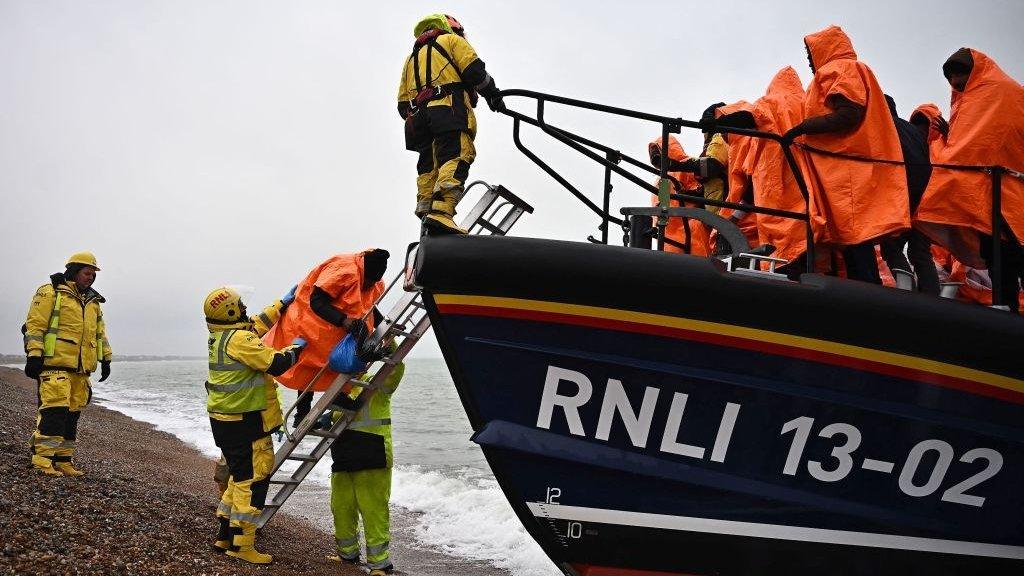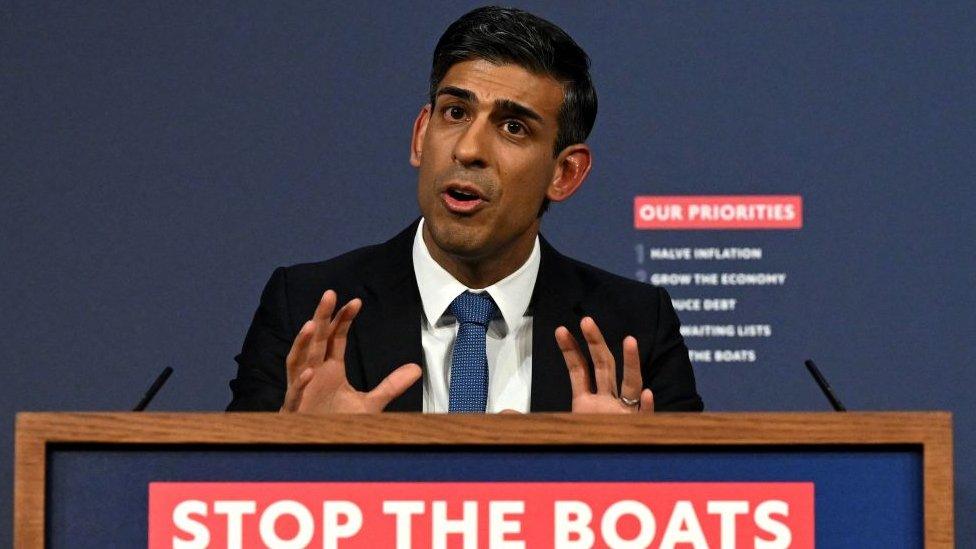Ministers see off Tory rebels over migration plans
- Published

The UK government has defused a rebellion from backbenchers wanting to toughen up new rules for removing migrants.
A group of Tory MPs had tabled several amendments to the Illegal Migration Bill, ahead of votes in Parliament.
But some withdrew their proposals, after minister Robert Jenrick said he would "engage" with Tory MPs who have concerns.
It follows talks between them and Home Secretary Suella Braverman.
The legislation, unveiled earlier this month, would prevent anyone entering the UK illegally from claiming asylum.
It is central to Prime Minister Rishi Sunak's pledge to "stop" small boats crossing the English Channel, but has provoked outrage among charities and opposition parties, which say it breaches international law.
Some Conservative MPs, however, believe it does not go far enough and tabled a series of amendments aiming to further toughen the bill.
Amendments they were supporting included one aiming to make it harder to challenge removal orders issued by courts.
Another would have meant the duty to remove migrants would apply irrespective of any orders issued by the European Court of Human Right (EHCR).
The Strasbourg-based court, unpopular on the Tory right, blocked the removal of migrants to Rwanda last year pending legal challenges.
Mr Jenrick assured Tory MPs he would speak to those who feared human rights law would interfere with the legislation.
Speaking during the bill's committee stage, he said: "I am certainly keen to give them an undertaking to engage with them and other colleagues who are interested in these points ahead of report stage of the bill.
"We are united in our determination that this bill will be a robust bill, that it will be able to survive the kind of egregious and vexatious legal challenges that we have seen in the past, and that it will enable us to do the job and to remove illegal immigrants to safe third countries like Rwanda."

Mr Sunak has made "stopping" small boats one of his top priorities as prime minister
Mr Jenrick also made commitments designed to resist pressure from a different group of Tory MPs to create more safe and legal routes for asylum seekers.
The group, led by East Worthing and Shoreham MP Tim Loughton, put forward proposals that would force ministers to establish more such routes before the rest of the bill can come into force.
They had been signed by former Brexit secretary David Davis and Dame Diana Johnson, the Labour chair of the home affairs select committee.
But Mr Sunak's spokesman told reporters it was necessary to "get a grip on those crossing illegally" before new legal routes are set up.
This was "so we can plan and make a proper decision about the numbers of people the country, local authorities, councils, GPs, are able to deal with each year," he added.
Mr Loughton withdrew the amendment after Mr Jenrick committed "to engage with him and other colleagues", and "if necessary bringing forward further amendments to ensure there are new routes in addition to the existing schemes".
On Monday night, MPs voted to reject four amendments that would have:
allowed individuals seeking asylum who claim to be victims of crime, human trafficking or deprived of their human rights, to remain in the UK during their asylum process
compelled the Home Office to establish a humanitarian travel permit scheme
made provision for unaccompanied asylum-seeking children coming from the EU to be allowed into the UK for the purposes of family reunion
forced the government to create co-operation deals with EU states regarding asylum-seeker illegal migration issues.
New powers
More than 45,000 people entered the UK via Channel crossings last year, up from about 300 in 2018.
Under the new bill, people removed from the UK would be blocked from returning or seeking British citizenship in future. Migrants will not get bail or be able to seek judicial review for the first 28 days of detention.
It will also place a legal duty on the home secretary to detain and remove those arriving in the UK illegally, to Rwanda or a "safe" third country - this will take legal precedence over someone's right to claim asylum.
In a letter to MPs following publication of the bill earlier this month, Ms Braverman conceded there is a "more (than) 50% chance" the bill is incompatible with international law.
It is expected to come up against opposition in the House of Lords, and subsequently expected to face a wave of legal challenges, whilst opposition parties have dismissed it as unworkable.